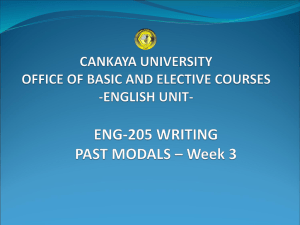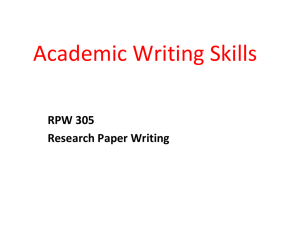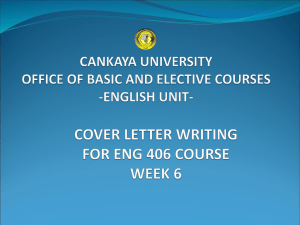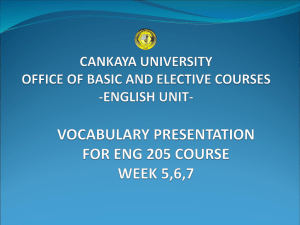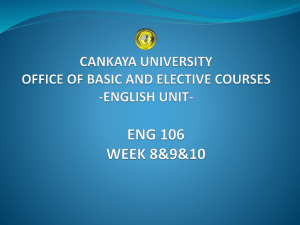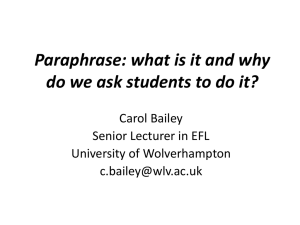Paraphrasing Techniques
advertisement
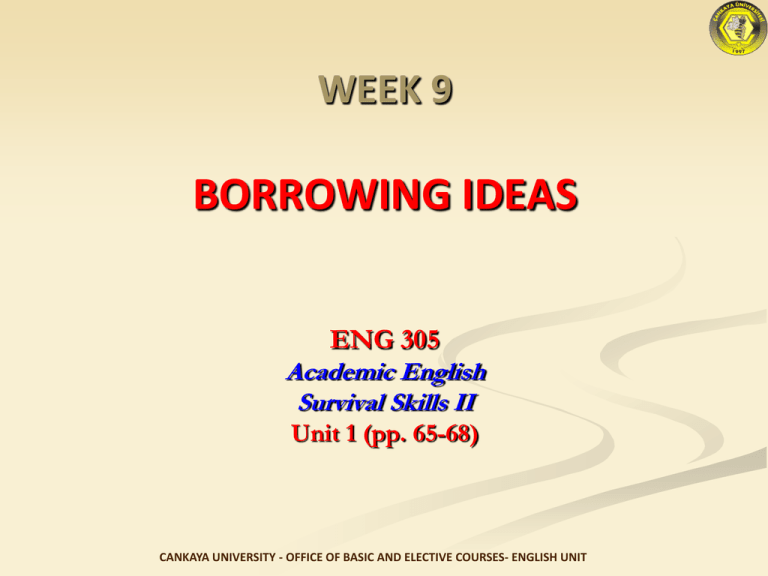
WEEK 9 BORROWING IDEAS ENG 305 Academic English Survival Skills II Unit 1 (pp. 65-68) CANKAYA UNIVERSITY - OFFICE OF BASIC AND ELECTIVE COURSES- ENGLISH UNIT Good excuse (!) Yet, it doesn’t refute the fact that the girl has plagiarised “the article they read last week.” CANKAYA UNIVERSITY - OFFICE OF BASIC AND ELECTIVE COURSES- ENGLISH UNIT Borrowing ideas • Scholars are required to present accurate and adequate support to convince their readers of their ideas in academic writing. • It often is not convincing enough to write about one’s personal experience; therefore, reference to an authority in newspaper, magazine article, or a book that supports an argument will make ideas more valid. CANKAYA UNIVERSITY - OFFICE OF BASIC AND ELECTIVE COURSES- ENGLISH UNIT Borrowing ideas Summarizing - a short restatement in your own words of the main points in a passage, an article, or a book - Used when borrowing information from various sources ranging from the length of one paragraph to an article or even a book • To paraphrase is to say the same thing in another way, using your own words. CANKAYA UNIVERSITY - OFFICE OF BASIC AND ELECTIVE COURSES- ENGLISH UNIT BASICS of PARAPHRASING • A paraphrase is usually the same length as the original passage and includes all the information. CANKAYA UNIVERSITY - OFFICE OF BASIC AND ELECTIVE COURSES- ENGLISH UNIT BASICS of PARAPHRASING • You may decide to paraphrase any densely written, or confusing material. • It is essential to rewrite a material in your own style by making sure that: - You use your own words and, - You change the grammatical structures. CANKAYA UNIVERSITY - OFFICE OF BASIC AND ELECTIVE COURSES- ENGLISH UNIT BASICS of PARAPHRASING • In order to avoid plagiarism, the paraphrased part needs; proper paranthetical reference (in-text reference) specifying; - the writer’s surname, - year of publication, - page / paragraph number. CANKAYA UNIVERSITY - OFFICE OF BASIC AND ELECTIVE COURSES- ENGLISH UNIT BASICS of PARAPHRASING • When changing grammar, you can; - divide the longer sentences into shorter ones, - join shorter ones with sentence connectors, - or make other grammatical changes. CANKAYA UNIVERSITY - OFFICE OF BASIC AND ELECTIVE COURSES- ENGLISH UNIT BASICS of PARAPHRASING • Original ideas remain unchanged in a paraphrase, that is, keeping the original meaning is the core of paraphrasing. • You replace the language of the original text by using different vocabulary, grammar, and writing style. • The paraphrase is approximately the same length as the original. CANKAYA UNIVERSITY - OFFICE OF BASIC AND ELECTIVE COURSES- ENGLISH UNIT What if you don’t understand a text? • You can even use paraphrasing as a tool for explaining to yourself the main ideas of a difficult passage HERE’S HOW: • Rewrite the parts that you have understood, and • Pinpoint the ones that you did not fully understand. • It’s easier to understand long texts in smaller groups of sentences of your own. Therefore, paraphrasing can be a learning tool as well. What if you don’t understand a text? • General temptation* of the students who find a text “very difficult” is to skip that material. RESIST THIS TEMPTATION! *temptation (n.): the desire to do or have something which you know you should not do or have. CANKAYA UNIVERSITY - OFFICE OF BASIC AND ELECTIVE COURSES- ENGLISH UNIT HOW TO PARAPHRASE • First of all, make sure that you understand the source passage. • Write what you understand without looking at the original. CANKAYA UNIVERSITY - OFFICE OF BASIC AND ELECTIVE COURSES- ENGLISH UNIT HOW TO PARAPHRASE • Paraphrase as much as possible by writing the text in your own style, making the necessary changes in the wording and grammar. • Compare your paraphrase with the original to make sure that you included all the ideas and you did not change the meaning. CANKAYA UNIVERSITY - OFFICE OF BASIC AND ELECTIVE COURSES- ENGLISH UNIT We can simplify paraphrasing by dividing it into 4 steps: STEP 1: Read the selection carefully several times until you understand it fully. STEP 2: Look up any words you do not understand; find synonyms for them. STEP 3: Write a brief outline, including: a. The main idea (topic and controlling idea) b. The main supporting points c. Primary and secondary supporting details STEP 4: Write the paraphrase. Use your own words and do not omit any essential ideas. CANKAYA UNIVERSITY - OFFICE OF BASIC AND ELECTIVE COURSES- ENGLISH UNIT HOW TO PARAPHRASE • Rearrange your own sentences so that they read smoothly. Sentence structure or even sentence order need not be based on those of the original. AND • Do not forget to include an in-text reference in your paraphrase. CANKAYA UNIVERSITY - OFFICE OF BASIC AND ELECTIVE COURSES- ENGLISH UNIT A Model Paraphrase • Original: When Maracaña soccer stadium [in Rio de Janerio, Brazil] was opened to the public in 1950, and Brazil lost the World Cup to the Uruguayan team, the Brazilians were so disheartened that one had the impression that the country itself had died. And people did die of sadness. Mere threats of defeat in a championship match can cause heart attacks and the despair of the public is so great that many beat their heads against the cement posts. Such is the Brazilian’s passion for soccer. • Outline: A. Brazil lost the World Cup in 1950. 1. Entire country was sad. 2. Some people died. B. Possible defeat causes strong reaction. 1. Some experience heart attacks. 2. Some beat their heads. C. Brazilians are very emotional about soccer. A Model Paraphrase • Outline: A. Brazil lost the World Cup in 1950. 1. Entire country was sad. 2. Some people died. B. Possible defeat causes strong reaction. 1. Some experience heart attacks. 2. Some beat their heads. C. Brazilians are very emotional about soccer. • Paraphrase: In 1950, Brazil lost the World Cup in soccer to Uruguay in Rio de Janerio. The entire country was overcome by sadness; some people even died from it. Brazilians react very strongly to potential defeat in championship soccer games. Some people have heart attacks, and others beat their heads against cement posts. Brazilians are very emotional about soccer. CANKAYA UNIVERSITY - OFFICE OF BASIC AND ELECTIVE COURSES- ENGLISH UNIT • Original: When Maracaña soccer stadium [in Rio de Janerio, Brazil] was opened to the public in 1950, and Brazil lost the World Cup to the Uruguayan team, the Brazilians were so disheartened that one had the impression that the country itself had died. And people did die of sadness. Mere threats of defeat in a championship match can cause heart attacks and the despair of the public is so great that many beat their heads against the cement posts. Such is the Brazilian’s passion for soccer. • Paraphrase: In 1950, Brazil lost the World Cup in soccer to Uruguay in Rio de Janerio. The entire country was overcome by sadness; some people even died from it. Brazilians react very strongly to potential defeat in championship soccer games. Some people have heart attacks, and others beat their heads against cement posts. Brazilians are very emotional about soccer. CANKAYA UNIVERSITY - OFFICE OF BASIC AND ELECTIVE COURSES- ENGLISH UNIT PARAPHRASING Techniques Tactics to rewrite something in a different way CANKAYA UNIVERSITY - OFFICE OF BASIC AND ELECTIVE COURSES- ENGLISH UNIT Paraphrasing We can successfully paraphrase by using a combination of techniques. Paraphrasing Techniques 1. 2. 3. 4. 5. Change from a Clause to a Phrase (or vice versa) Change from Quoted Speech to Indirect Speech (or vice versa) Change from Active Voice to Passive Voice (or vice versa) Change to Synonyms Change Word Forms CANKAYA UNIVERSITY - OFFICE OF BASIC AND ELECTIVE COURSES- ENGLISH UNIT Change from a Clause to a Phrase After he studied, John took a nap. After studying, John took a nap. The house across the street is new. The house that is across the street is new. Change from Quoted Speech to Indirect Speech Mr. Lee said, “I am ready for lunch.” Mr. Lee said he was ready for lunch. “I am ready for lunch.” Change from Active Voice to Passive Voice A hotel employee will carry your bags. Your bags will be carried by a hotel employee. ……and replace words with synonyms. A hotel employee will carry your bags. Your bags will be carried by a hotel employee. Your luggage will be picked up by a bell boy. Change Word Forms Use an adverb instead of an adjective Use a verb to replace a noun. GROG is an accurate typist. GROG types accurately. CANKAYA UNIVERSITY - OFFICE OF BASIC AND ELECTIVE COURSES- ENGLISH UNIT Change to Synonyms Replace the original words with words that mean the same. The stallion was content with the mare. The stallion was happy with the mare. When You can’t find a Synonym Replace the original word with a definition. The stallion was content with the mare. The male horse was happy with the female horse. Change to Synonyms • Your best friend when trying to find the synonym of a vocabulary item is a THESAURUS DICTIONARY. • You can own a thesaurus dictionary, or download a soft version of it on your computer. • You can also search for online thesaurus dictionaries. Change to Synonyms • However, be careful when choosing among the synonyms of a word, especially of a verb: Always check the meaning twice if you see that word for the first time. Combine Techniques Change to a phrase & add synonyms or definitions After he ate lunch, Mike took a nap. After eating lunch, Mike slept a little. CANKAYA UNIVERSITY - OFFICE OF BASIC AND ELECTIVE COURSES- ENGLISH UNIT Combine Techniques Change to a phrase & add synonyms or definitions The house that is across the street is old. The house across the street is old. The house on the other side of the street is old. The dwelling on the other side of the road is ancient. Interpret Meaning…….Identify the underlying meaning of a statement. The wolf said, “I am ready for lunch.” The sheep looked very worried. The wolf complained about being hungry which made the sheep extremely anxious. I am ready for Lunch Change transitions Although it was raining, Bob walked to work. It was raining, but Bob walked to work. It was raining; however, Bob walked to work. CANKAYA UNIVERSITY - OFFICE OF BASIC AND ELECTIVE COURSES- ENGLISH UNIT …… and change word forms Although it was raining, Bob walked to work. It was raining, but Bob walked to work. It was raining; however, Bob walked to work. Despite the rain, Bob went to work on foot. CANKAYA UNIVERSITY - OFFICE OF BASIC AND ELECTIVE COURSES- ENGLISH UNIT Your Turn Paraphrase the following: • Today, people are worried about internet security. • Advocates of internet tracking believe that it helps marketers to understand what people want. • People who oppose internet tracking believe that it is an invasion of privacy. • This information age will cause more and more people to become concerned with the level of personal detail that can be found from the Internet. Variations: • Today, people are worried about internet security. - How secure their Internet is a topic of concern for users, nowadays. - It bothers people to think about internet security these days. - It’s bothering to think about internet security nowadays. CANKAYA UNIVERSITY - OFFICE OF BASIC AND ELECTIVE COURSES- ENGLISH UNIT Variations: Advocates of internet tracking believe that it helps marketers to understand what people want. - Those who support internet tracking maintain that it makes it easier for marketers to have an idea about people’s demands. CANKAYA UNIVERSITY - OFFICE OF BASIC AND ELECTIVE COURSES- ENGLISH UNIT Variations: - - People who oppose internet tracking believe that it is an invasion of privacy. Opponents of internet tracking think that it is disrecpecting privacy. Opposers to internet tracking claim that this is intervening with people’s private lives. CANKAYA UNIVERSITY - OFFICE OF BASIC AND ELECTIVE COURSES- ENGLISH UNIT Variations: This information age will cause more and more people to become concerned about the level of personal detail that can be found from the Internet. - Even more people will be worried about how much of their personal information can be tracked on the Internet in this information age. CANKAYA UNIVERSITY - OFFICE OF BASIC AND ELECTIVE COURSES- ENGLISH UNIT SAMPLE PARAPHRASES (p. 66) Examine the given paragraph and its paraphrases. Which one is better? Discuss reasons. ANSWER: Paraphrase 1 is NOT correct firstly because - it gives wrong information (that the typical voter is deeply interested in political issues, with which the original disagrees), - secondly because it does not mention a key element in the original text (television), - and lastly because it does not include any in-text citation. TASK 7 (p. 67) Read the given paragraph and its paraphrases. Decide which one is better and discuss why. ANSWER: 1. This is not a good paraphrase because the writer only replaced the words with new words but has not changed the structure of the original. 2. This is a better version. TASK 7 (continued) Look at paraphrase 2 again. Why are the phrases “frontier background” and “financial and real estate investments” in quotation marks? ANSWER: - Because they are direct quotations; that is, they are taken as they are from the original text without being changed. CANKAYA UNIVERSITY - OFFICE OF BASIC AND ELECTIVE COURSES- ENGLISH UNIT PARAPHRASE ACTIVITY WORKSHEET CANKAYA UNIVERSITY - OFFICE OF BASIC AND ELECTIVE COURSES- ENGLISH UNIT TASK 8 (p. 67-68) STEP 1: Read the first paragraph and try to find synonyms and/or definitions of the words in the paragraph. STEP 2: Have a look at the given synonyms. STEP 3: Paraphrase it. CANKAYA UNIVERSITY - OFFICE OF BASIC AND ELECTIVE COURSES- ENGLISH UNIT • reasonable (adj.): logical, sensible • reasonable man: man who can judge well • praise (v.): admire, approve, give approval • contempt (n.): a strong dislike, antipathy, despisal CANKAYA UNIVERSITY - OFFICE OF BASIC AND ELECTIVE COURSES- ENGLISH UNIT • admit (v.): accept; accept the truth • benefit (v.): to be beneficial, to be useful / get benefits, get advantages • proud (adj.): self-important, boastful • ruthless (adj.): merciless, brutal • obsessed with (v.): preoccupied with; unable to stop thinking about CANKAYA UNIVERSITY - OFFICE OF BASIC AND ELECTIVE COURSES- ENGLISH UNIT • challenge (v.): threaten, dare • determined (adj. / v.): resolved, having made up one’s mind • rid (v.): get rid of, free oneself from, • stamp out (v.): destroy, eradicate CANKAYA UNIVERSITY - OFFICE OF BASIC AND ELECTIVE COURSES- ENGLISH UNIT • dreaded (adj.): terrifying, terrible, fearful, terrorizing • No strangers to violence: to be used to / accustomed to violence • temporarily (adv.): for a short time, for a limited time / period CANKAYA UNIVERSITY - OFFICE OF BASIC AND ELECTIVE COURSES- ENGLISH UNIT Now Paraphrase the paragraph. SAMPLE PARAPHRASE (Paragraph 1) 1. Although very few people admire B. Mussolini because of what he has done for his country, even people who despise him accept that the country derived great benefits from the way he fought with Mafia. It was an obsession with Mussolini, a cruel and arrogant dictator, that Mafia was a challenge to his authority. As he was determined to destroy any group which he could not keep under control, Mussolini, with the help of police officials who were themselves quite familiar with violence, was able to control the much feared mafia, however, for a temporary period (Flemming, 1999, p.20). CANKAYA UNIVERSITY - OFFICE OF BASIC AND ELECTIVE COURSES- ENGLISH UNIT TASK 8 (p. 67-68) Paragraph 2 Paragraph 3 CANKAYA UNIVERSITY - OFFICE OF BASIC AND ELECTIVE COURSES- ENGLISH UNIT Study Pack • Do the exercises on pp. 26-28 • Do the multiple Choice Questions on p. 32 CANKAYA UNIVERSITY - OFFICE OF BASIC AND ELECTIVE COURSES- ENGLISH UNIT
